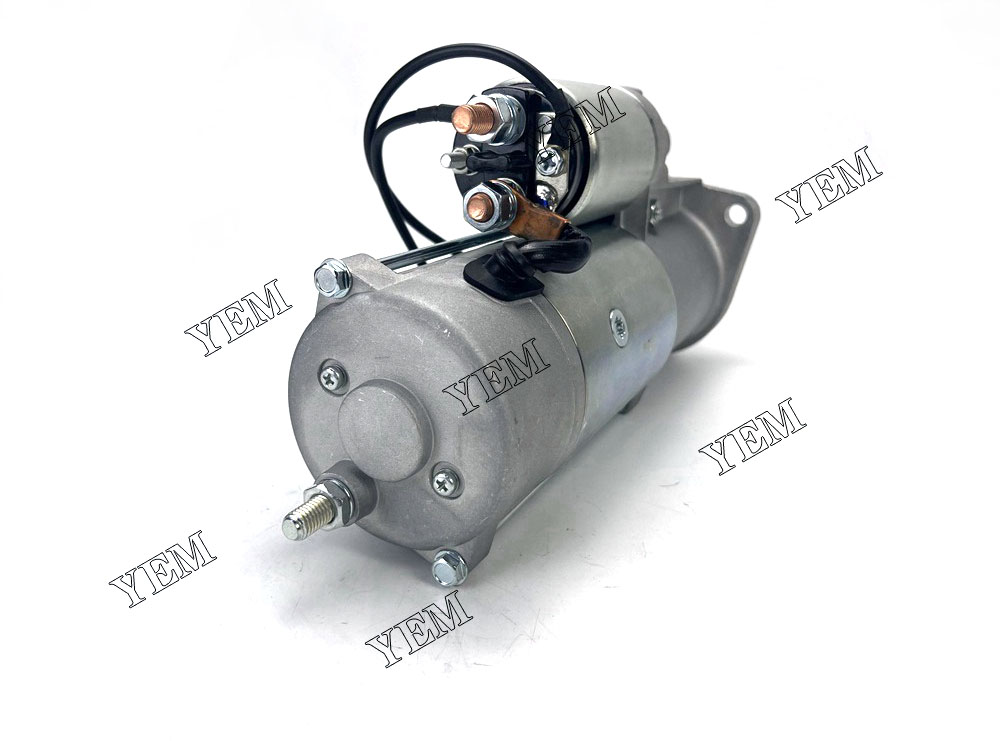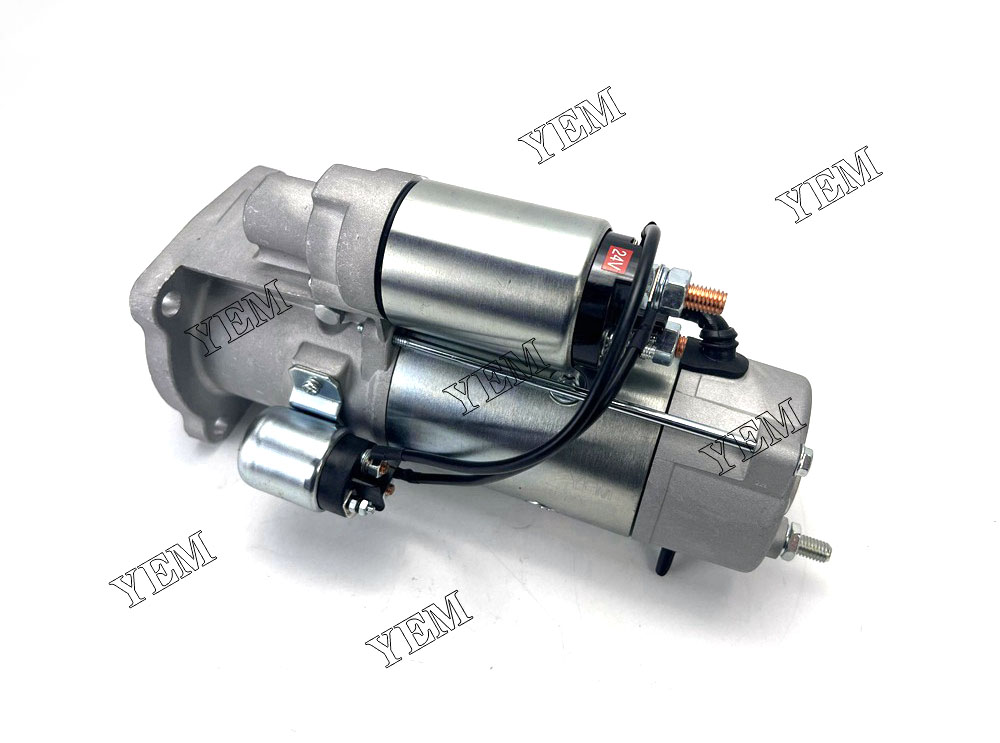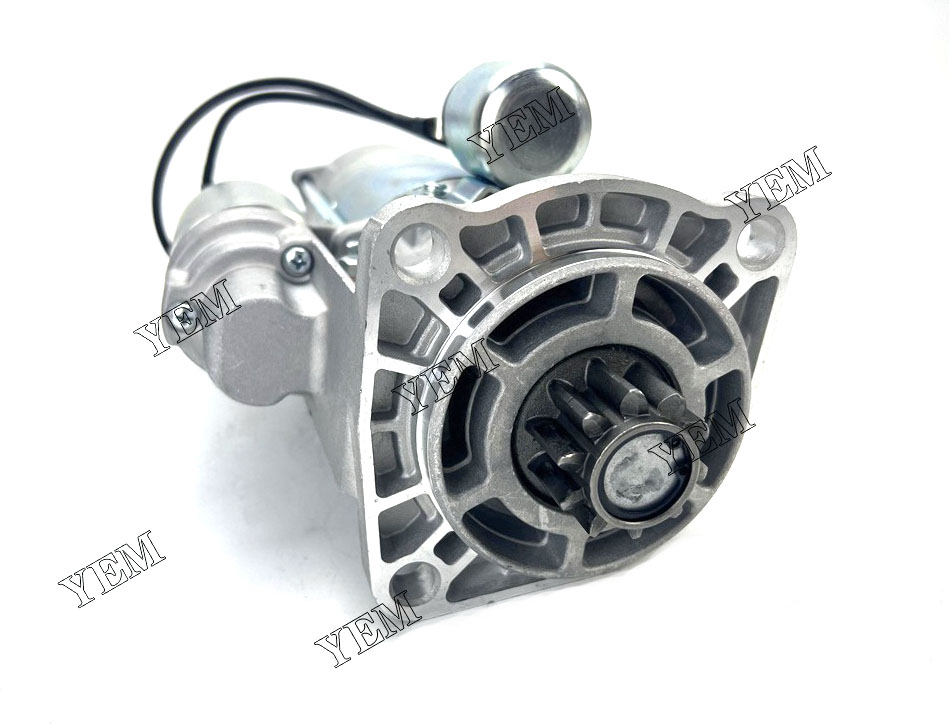A starter motor is an electric device used to start an internal combustion engine. It is commonly used in cars, motorcycles, boats and other mechanical equipment that requires an internal combustion engine to start.
The basic principle of a starter motor is to generate enough torque to help start the internal combustion engine by converting electrical energy into mechanical energy. It consists of an electric motor, transmission mechanism and gears.
When the starter motor receives a start signal, the electric motor begins to run. The electrical energy is converted into rotational torque, which is then transferred to the flywheel of the internal combustion engine via a transmission. The flywheel starts to turn, turning the crankshaft, which turns the internal combustion engine.
The starter motor is usually powered by a DC power source and has a high enough starting torque to overcome the inertia of the internal combustion engine and the resistance of the compressed gas. Once the internal combustion engine has successfully started and started burning fuel, the starter motor stops.
It is important to note that different types of internal combustion engines may require different types of starter motors. For example, diesel engines tend to require more starting torque due to their higher compression ratios and greater resistance to starting. For this reason, diesel engines are usually equipped with more powerful starter motors.
All in all, the starter motor provides enough torque to start the internal combustion engine by converting electrical energy into mechanical energy. It plays an important role in the startup process of cars and other devices.
The overall importance and role of the starter motor in the excavator engine
The starter motor plays an important role in the excavator engine. The following are its main importance and role:

- Start the engine: Excavator engines usually require external energy to start. The starter motor turns the engine’s crankshaft by providing enough torque and rpm to start it running. It starts the coolant circulation, oil circulation and other critical systems to keep the engine running properly.
- Provide starting ability: Excavators usually need to start under various working conditions, including low temperature environments or high altitude areas. The starter motor must have enough power and torque to overcome the internal resistance of the engine and ensure reliable starting of the engine.
- Quick response: Excavators often need to start and stop in a short time to adapt to different work needs. The starter motor can quickly respond to the operator’s command and start or stop the engine in a short period of time, improving work efficiency.
- Protects the engine: The starter motor also helps protect the engine and other related components from damage. For example, during engine starting, if the engine fails to start properly, the starter motor will usually automatically shut down, avoiding excessive load or other potential problems.
To sum up, the starter motor has a key importance and role in the excavator engine, which can reliably start the engine and provide the necessary starting ability, while protecting the engine from damage.
Excavator starter motor type
The excavator starter motor usually adopts two types of hydraulic starter motor or electric starter motor.
- Hydraulic starter motor: A hydraulic starter motor is a starting device powered by a hydraulic system. It starts the engine of the excavator by sending hydraulic oil into the inside of the motor to generate rotational torque. The hydraulic starter motor has the advantages of high torque and fast starting speed, suitable for large excavators and heavy equipment.
- Electric starter motor: The electric starter motor is driven by an electric motor to start the excavator. An electric starter motor needs to be connected to the power system and convert electrical energy into mechanical energy to start the engine. Electric starter motors are better suited for mini excavators and light equipment than hydraulic starter motors.
The type of starter motor to choose depends on factors such as the size of the excavator, the application environment, and operational needs.
How the excavator starter motor works
The working principle of excavator starter motor depends on the specific type of use, hydraulic starter motor and electric starter motor have different working principles.

- The working principle of the hydraulic starter motor:
- The hydraulic starter motor receives high pressure fluid from the hydraulic system.
- High-pressure fluid enters the rotor or gear train inside the motor, creating a rotational torque.
- The rotational torque is transmitted via the drive shaft to the crankshaft of the excavator engine, causing it to start turning.
- Once the engine starts and runs stably, the hydraulic starter motor will stop supplying hydraulic pressure.
- The working principle of the electric starter motor:
- The electric starter motor is connected to the power system and driven by electric energy.
- When the starter button is pressed, current flows through the windings of the electric starter motor.
- The current creates an electromagnetic field in the windings, which interacts with permanent magnets or electromagnets.
- Electromagnetic force pushes the rotor of the motor to start spinning.
- The rotational torque of the rotor is transmitted to the crankshaft of the excavator engine through the transmission, thereby enabling starting.
Whether it is a hydraulic starter motor or an electric starter motor, their goal is to provide enough rotational torque to start the excavator engine and start it running. Which starter motor to choose depends on the design and operating requirements of the excavator.
Application areas of excavator starter motors
Excavator starter motors are widely used in various engineering and construction fields, especially where earthworks, excavation, handling and construction operations are required. The following are some major application areas:
- Construction site: Excavator starter motors are often used in earthworks on construction sites, such as excavating foundation pits, cleaning up waste and landfills, and digging ditches.
- Mines and Quarries: Excavator starter motors are used in mines and quarries for mining operations, including excavating ore, loading and unloading ore, clearing working faces, etc.
- Road and railway construction: In road and railway construction, excavator starter motors can be used to excavate soil and rocks, open road passages, level roadbeds, etc.
- Ports and docks: Excavator starter motors can be used in the construction and maintenance of ports and docks, including tasks such as digging waterways, loading and unloading cargo, and repairing docks.
- Agriculture and horticulture: In the field of agriculture and horticulture, excavator starter motors can be used for operations such as land preparation, drainage system construction, moving and stacking agricultural products.
- Garbage disposal and waste management: Excavator starter motors can be used to dispose of trash and waste, including tasks such as excavating landfills, loading and unloading waste, and cleaning contaminated areas.
- Water conservancy projects: In water conservancy projects, excavator starter motors can be used to build and maintain dams, canals, embankments, etc.
In conclusion, excavator starter motors are used in a wide range of applications and cover many fields of earthmoving, excavation and handling tasks. Their high efficiency and powerful power make them important construction and engineering equipment.

Excavator starter motor selection guide
Choosing the right excavator starter motor requires consideration of multiple factors, including the type of excavator, working environment, power requirements, and budget. Here are some selection guidelines for reference:
- Excavator type: Different types of excavators may require different types of starter motors. For example, small excavators typically use an electric starter motor, while larger excavators may require a more powerful hydraulic starter motor.
- Power requirements: Select the starter motor according to the power requirements of the excavator engine. Make sure the starter motor can provide enough torque to start the engine and is matched with the engine.
- Working environment: Consider the working environment conditions of the excavator. If the working environment is harsh, such as high temperature, low temperature or dusty environment, it is necessary to choose a starter motor with good tolerance and adaptability.
- Reliability and durability: choose a starter motor with high reliability and long life to reduce failure and maintenance costs. You can refer to product specifications and user reviews to understand the performance and reliability of starter motors.
- Budget and cost-effectiveness: choose a suitable starter motor based on budget constraints and cost-effectiveness considerations. Compare the price, performance and quality of different makes and models to find the sweet spot.
- Manufacturer support and after-sales service: Choose a manufacturer with a good reputation and ensure that it provides good after-sales service and technical support.
In the selection process of the excavator starter motor, you can also consult professional engineers or communicate with experienced excavator users to obtain more specific and practical suggestions.
Excavator starter motor troubleshooting and maintenance
When the excavator starter motor fails, the following troubleshooting steps and maintenance measures can be considered:
- Check the power supply: If it is an electric starter motor, first check whether the power connection is normal. Make sure the battery is charged well, and check for damaged or loose parts such as cables, connectors, and fuses.
- Check the transmission system: For hydraulic starter motors, check the operation of the hydraulic system. Make sure that the hydraulic oil level is sufficient and there is no leakage, and check whether the hydraulic pumps, valves and pipelines are working properly.
- Cleaning and Lubricating: Regularly clean the exterior surfaces of the starter motor to prevent the buildup of dust and grime. At the same time, regularly lubricate critical components according to the manufacturer’s recommendations to ensure smooth operation and extended life.
- Check sensors and switches: Some starter motors may be equipped with sensors and switches to monitor and control operation. Check that these components are working properly to avoid starting problems due to sensor failure.
- Check the wires and connectors: Check that the starter motor wires and connectors are intact and not broken, corroded, or loose. Repair or replace as necessary.
- Periodic Maintenance: Perform periodic maintenance on the starter motor according to the manufacturer’s recommendations. This includes changing filters, checking motor insulation, and calibrating sensors to ensure proper functioning of the starter motor.
If the above troubleshooting methods cannot solve the problem, it is recommended to contact professional technicians or the after-sales service department of the excavator manufacturer for further support and guidance.

Excavator starter motor technology development trends
In terms of technological development of excavator starter motors, the following are some possible trends:
- Electrification: With the increasing requirements for environmental friendliness and energy efficiency, excavator starter motors may develop towards more electrification. Electric starter motors have the advantages of high efficiency, low noise and zero emissions, which can reduce the dependence on traditional fuel.
- Hydraulic technology improvements: Hydraulic starter motors are widely used in large excavators, and the future may see more hydraulic technology improvements. This includes improving the efficiency and responsiveness of the hydraulic system, reducing energy loss and providing better control performance.
- Intelligence and automation: With the continuous development of artificial intelligence and automation technology, excavator starter motors may integrate more intelligent functions. For example, automatic diagnostics and troubleshooting through sensors and feedback mechanisms, as well as remote monitoring and control functions.
- Lightweight and high-strength materials: In order to improve the overall efficiency and performance of the excavator, the starter motor may use lightweight design and high-strength materials. This reduces the weight of the excavator, improves fuel economy, and increases load capacity.
- Energy saving and environmental protection: Energy saving and environmental protection are important issues worldwide. Future excavator starter motors may trend towards higher energy efficiency and lower emission levels to meet environmental regulations and market demands.
These are just some of the possible trends in the development of excavator starter motor technology, and it is likely to continue to evolve with technological innovation and changes in market demand. The specific development depends on factors such as industry demand, technical feasibility and market competition.
Contact us
YEM Professional Excavator Parts Team is a dedicated and experienced team that specializes in providing high quality parts for excavators. With extensive knowledge and expertise in this field, we are able to provide a wide range of parts to meet the diverse needs of our customers.
Whether you need replacement parts for hydraulic systems, engine components, chassis components or any other excavator component, the YEM team has you covered. We source our products from reputable manufacturers and ensure that each part meets the highest standards of quality and durability.
In addition to their impressive product selection, the YEM team prides itself on providing exceptional customer service. We understand the importance of timely support and strive to respond to inquiries and requests in a timely manner. Our knowledgeable staff is on hand to help customers identify the correct parts for their particular excavator model and provide installation and maintenance instructions.
To get in touch with the YEM Specialized Excavator Parts team you can contact us via our website, email or phone. We are committed to building long-term relationships with our customers and are eager to assist you with all your excavator parts needs.
